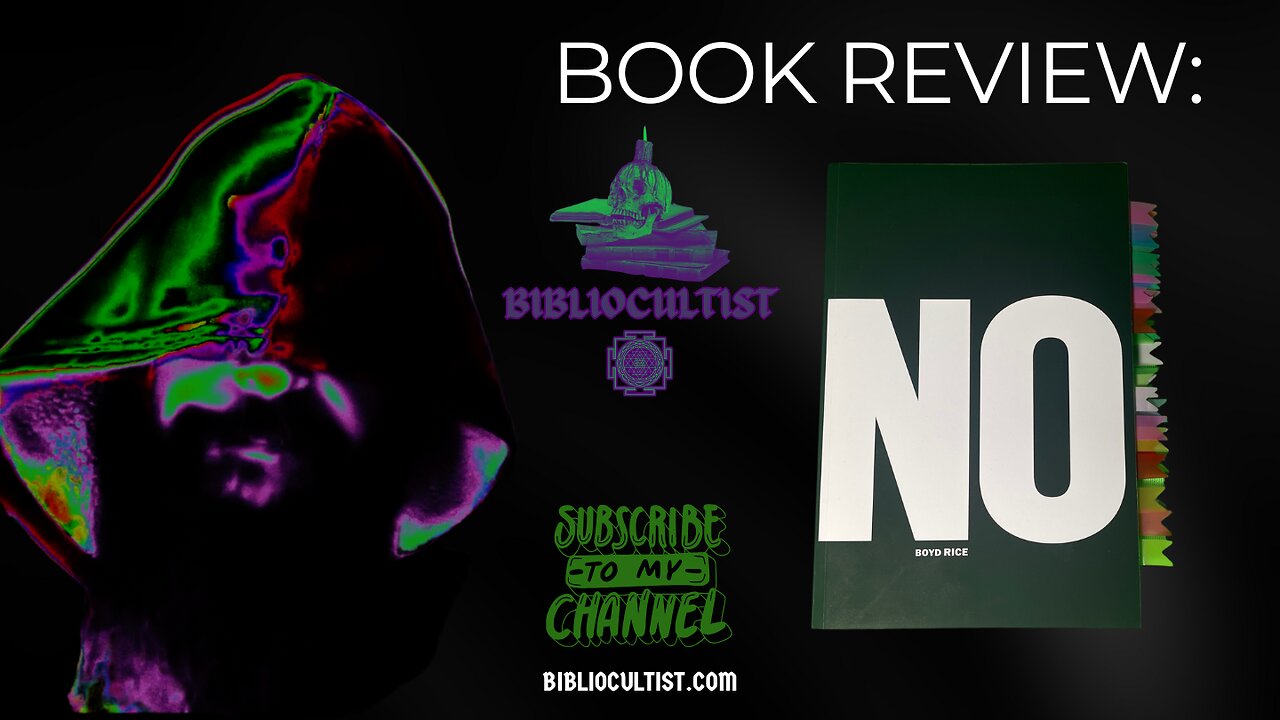Premium Only Content

Philosophy for the Bold: Why Boyd Rice's 'NO' Is an Important Read
*CHECK OUT MY MERCH: https://bibliocultist.printful.me/*
In this spoiler-free #bookreview and #bookrecommendation, I explore Boyd Rice's provocative philosophical work ‘NO’, which challenges modern presuppositions about equality, individuality, and peace. Rice presents unconventional ideas in a simplified, everyday language, deconstructing complex concepts to reveal deeper truths. The book critiques the obsession with atomized individualism, arguing for a more nuanced notion of identity. It also suggests that true harmony requires hierarchy and authoritarian imposition, contrasting egalitarian ideals. An insightful and thought-provoking read that will make you rethink many assumptions.
*all music and content copyright BiblioCultist.com*
#booktube #books #philosophy #BoydRice #no #individuality #authority #hierarchy #presuppositions #biblio #cultist #satanism #lavey #churchofsatan
**SHOW NOTES**
1. Boyd Rice, also known by his stage name NON, is an American musician, writer, and countercultural figure born in 1956. He is best known for pioneering industrial music with his project NON, which features abrasive sounds, noise, and transgressive themes that challenge societal norms. Rice's work has been both controversial and influential in experimental and avant-garde circles since the 1970s.
2. The "Left-Hand Path" is a term rooted in esoteric and occult traditions, symbolizing practices centered on individualism, self-deification, and the pursuit of personal power or enlightenment through methods considered taboo or transgressive. Historically, it originates from Tantra and Western esotericism, where it contrasts with the "Right-Hand Path," which emphasizes conformity to moral laws, divine worship, and collective good. The Left-Hand Path focuses on breaking societal norms and exploring forbidden knowledge to achieve liberation and self-mastery.
3. The Catholic heresy of Modernism emerged in the late 19th and early 20th centuries as an attempt to align Catholic doctrine with modern intellectual trends like historical criticism, evolutionary theory, and secular philosophy. It proposed that religious truth evolves over time and is influenced by cultural and historical contexts, challenging the notion of unchanging doctrines. In contrast, the broader philosophy of Modernism focuses on progress, individualism, and skepticism toward tradition, often embracing scientific and secular worldviews without necessarily engaging with religion.
4. The Pax Romana, or "Roman Peace," was a roughly 200-year period of relative stability and prosperity in the Roman Empire, beginning with the reign of Augustus (27 BCE) and lasting until the death of Marcus Aurelius (180 CE). This era of peace was largely achieved through the imposition of a strong, centralized autocratic dictatorship, where the emperor wielded absolute authority over the vast empire. The Romans maintained order through military might, strict legal systems, and efficient administration, suppressing rebellions and deterring external threats with overwhelming force.
5. John Locke and Jean-Jacques Rousseau are often credited with popularizing the concept of "natural rights," which they claimed were inherent to all individuals by virtue of their humanity. Locke emphasized life, liberty, and property, while Rousseau focused on freedom and equality in the "state of nature." However, these notions have been criticized as philosophically flawed and impractical, as they rely on abstract ideals disconnected from the realities of power and governance. The idea of "secular humanism," which emerged from such Enlightenment ideals, can be seen as the de facto religion of the modern world, replacing divine authority with a quasi-religious faith in human reason, progress, and autonomy.
6. The Protestant Reformation, initiated by figures like Martin Luther and John Calvin in the 16th century, was a religious upheaval that challenged the Catholic Church’s authority, emphasizing individual interpretation of Scripture and salvation by faith alone. Its intellectual roots, however, can be traced to nominalism, a philosophical movement that rejected universal truths, focusing instead on particulars and subjective experience. This shift undermined the medieval synthesis of faith and reason, fragmenting Christian unity and paving the way for skepticism about objective authority.
7. Anton LaVey, founder of the Church of Satan and author of The Satanic Bible, was a key figure in modern occultism, advocating for individualism, atheism, and rebellion against societal norms. He formed a close friendship with countercultural artist Boyd Rice, who shared his interest in the Left-Hand Path and transgressive philosophies. Toward the end of his life, LaVey considered naming Rice as his successor to lead the Church of Satan, but Rice declined, preferring to remain independent and focus on his artistic and philosophical projects rather than taking on institutional leadership.
-
 8:49
8:49
Millionaire Mentor
15 hours agoMAGA Vet SHUTS DOWN AOC So Hard She LOST IT
1.88K7 -
 7:25
7:25
The Shannon Joy Show
15 hours agoWhat is the PRIME Act? With Rep. Thomas Massie
2.28K3 -
 24:17
24:17
The Official Corbett Report Rumble Channel
11 hours agoGates' Fake Meat Agenda Flops! - #NewWorldNextWeek
3.34K9 -
 34:08
34:08
Simply Bitcoin
1 day ago $0.74 earnedLiving Off Bitcoin: Solar Mining in a Trailer
2.74K -
 LIVE
LIVE
Side Scrollers Podcast
18 hours ago🔴FIRST EVER RUMBLE SUB-A-THON🔴DAY 4🔴BLABS VS STREET FIGHTER!
1,280 watching -
 LIVE
LIVE
Lofi Girl
2 years agoSynthwave Radio 🌌 - beats to chill/game to
136 watching -
 25:45
25:45
Simply Bitcoin
1 day ago $1.16 earnedBitcoin Nomads: Building Circular Economies in Africa
5.63K -
 1:09:06
1:09:06
Mike Rowe
13 hours agoWhy Are There Condoms In Women's Prisons? | Amie Ichikawa #454 | The Way I Heard It
8.5K11 -
 34:05
34:05
Matt Kohrs
19 hours agoPlan B w/ Preston Pysh || The Matt Kohrs Show
18.2K -
 2:10:55
2:10:55
MG Show
19 hours agoPeter Navarro Destroys the CFR; President Trump Meeting with Secretary General of NATO
17.9K13